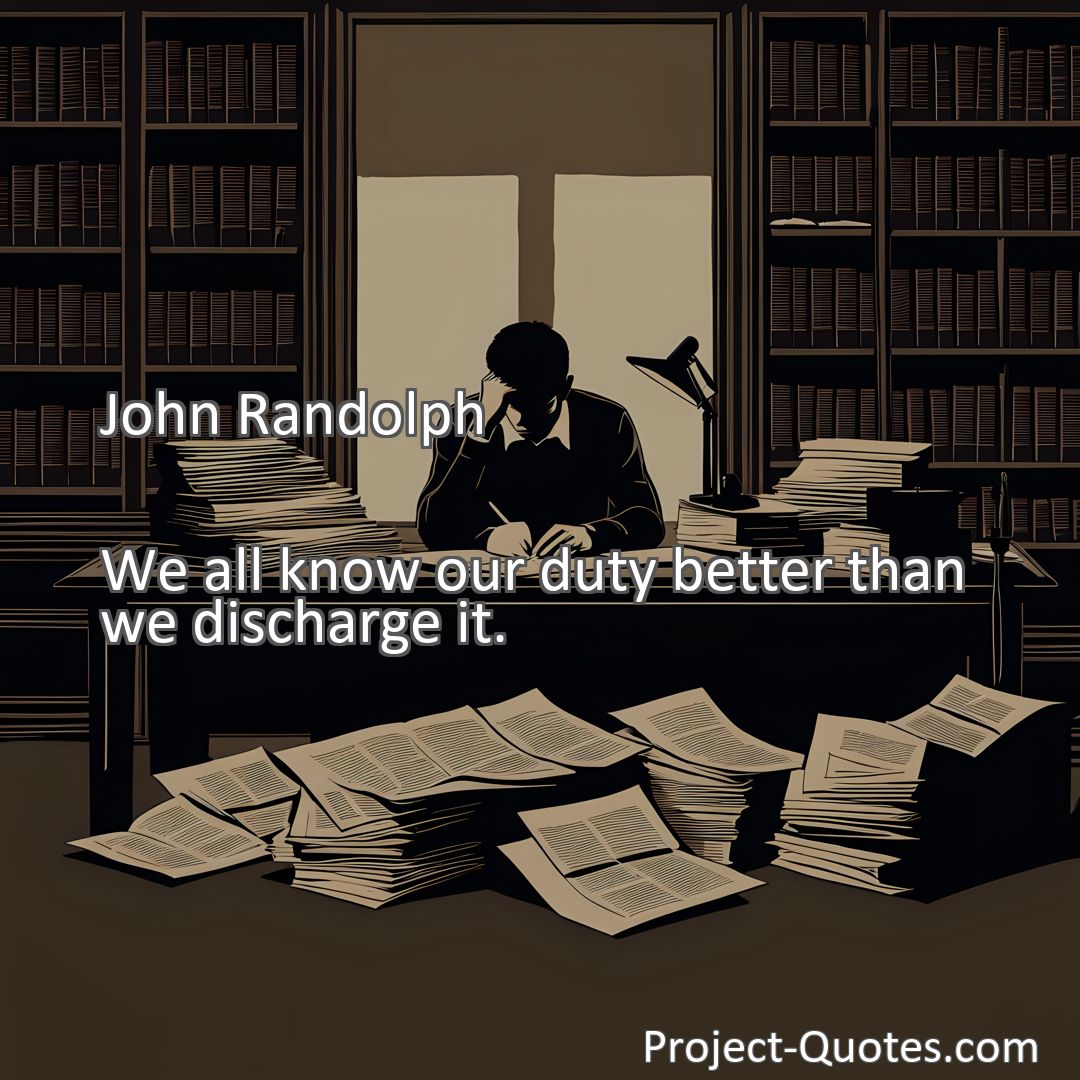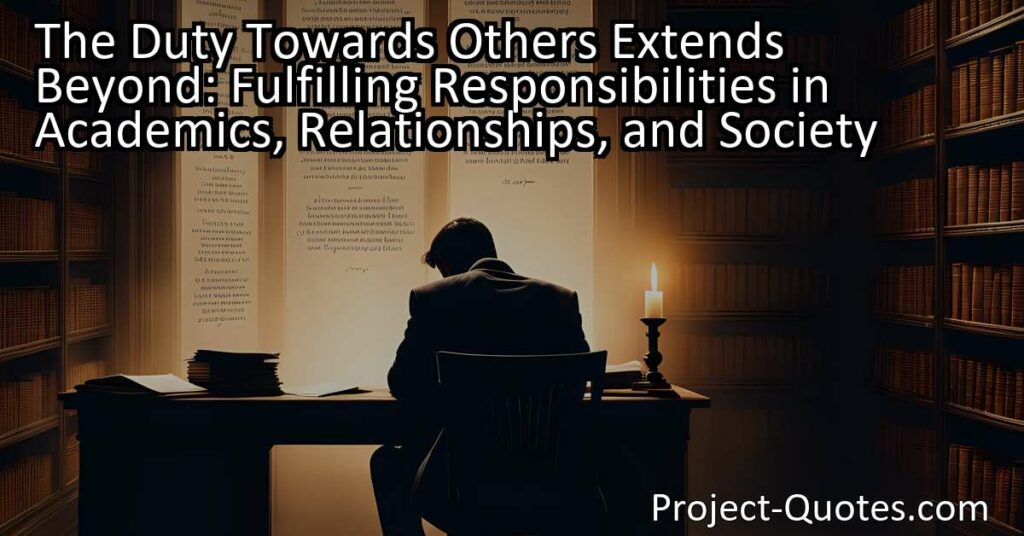We all know our duty better than we discharge it.
John Randolph
Fulfilling our duty towards others extends beyond academics, relationships, and society. Whether it’s meeting our academic responsibilities, treating others with kindness and empathy, or making positive contributions to society, we often fall short in discharging our duties. However, by recognizing distractions, cultivating awareness, and making incremental changes, we can bridge the gap between knowing our duty and actually fulfilling it.
Table of Contents
Meaning of Quote – We all know our duty better than we discharge it.
Have you ever heard the saying, “We all know our duty better than we discharge it”? It’s a powerful statement that suggests that deep down, we all have an understanding of what is expected of us, but we often fall short in fulfilling those responsibilities. This quote can be applied to various aspects of our lives, whether it’s our studies, relationships, or even our contributions to society. Let’s explore this idea further and think about why it might be the case that we often struggle to meet our obligations.
One area where this quote often rings true is in our academic lives. As students, we are well aware of the importance of attending classes, completing assignments, and studying for exams. We understand that education is crucial for our future success and that we have a duty to ourselves to make the most of our opportunities. However, despite this awareness, it is not uncommon to find ourselves procrastinating, prioritizing other activities over our schoolwork, or failing to put in the necessary effort to excel academically.
So why do we struggle to fulfill our duty as students? One possible reason is the presence of distractions in our lives. With the rise of technology and social media, it has become easier than ever to become engrossed in a never-ending stream of notifications and entertainment. It can be difficult to resist the temptation to check our phones or browse the internet when we should be focusing on our studies. These distractions can lead to a lack of discipline and a failure to properly allocate our time and energy towards our academic responsibilities.
Another reason could be a lack of motivation or a disconnect between our long-term goals and our day-to-day actions. While we may understand the importance of getting good grades and gaining knowledge, it can be challenging to maintain motivation when faced with daily tasks that may seem tedious or irrelevant. This misalignment between our aspirations and our present actions can lead to a lack of commitment and a failure to fulfill our duty as students.
However, it is important to recognize that fulfilling our duty goes beyond just academic responsibilities. This quote can also be applied to our personal relationships and how we treat others. We all know that it is our duty to be kind, empathetic, and respectful towards others, but how often do we fall short in this regard? Sometimes, in the busyness of our lives, we may overlook the needs and feelings of those around us. We may fail to reach out to a friend who is going through a tough time or ignore the signs of distress in a family member. We may even engage in hurtful behavior towards others, whether it’s through gossip, bullying, or simply not showing appreciation for the people in our lives.
It is worth considering why we struggle to discharge this fundamental duty towards others. One reason could be a lack of awareness or understanding of the impact our actions have on those around us. We may not always realize the significance of our words or actions and how they can deeply affect others. It is important to cultivate empathy and to develop awareness of how our behavior can either contribute positively or negatively to the well-being of those around us.
Another reason for failing to fulfill our duty towards others is self-centeredness. As human beings, we naturally have our own needs and desires, and it can be challenging to step outside of ourselves and prioritize the needs of others. This self-centeredness often manifests as a lack of consideration, empathy, or willingness to go the extra mile for someone else. However, it is crucial to remember that our duty towards others extends beyond our own personal interests; it is about being a supportive friend, a caring family member, and an active member of our communities.
Lastly, this quote can also apply to our duty as citizens of society. We all have a responsibility to contribute positively to the world in which we live, whether it’s through volunteer work, advocacy for important causes, or simply being a responsible citizen. However, it is not uncommon to see individuals who are aware of these duties yet fail to take action. This can be due to various reasons, such as a lack of knowledge on how to contribute, a sense of apathy or disillusionment, or even a fear of stepping out of our comfort zones.
So, how can we bridge the gap between what we know is our duty and actually discharging it? One approach is to start small and make incremental changes in our behaviors and mindset. For example, in our academic lives, we can set realistic goals, create a study schedule, and break tasks into manageable chunks to avoid becoming overwhelmed. Likewise, in our personal relationships, we can practice active listening, show gratitude, and make an effort to be present and attentive to the needs of others.
Additionally, it is important to seek inspiration and surround ourselves with positive influences. This could mean finding mentors or role models who exemplify the values and behaviors we aspire to adopt. It could also involve seeking out communities or groups that share our interests and passions, where we can find support and encouragement in fulfilling our duties.
In conclusion, the quote “We all know our duty better than we discharge it” resonates with many aspects of our lives, be it in our academic pursuits, our personal relationships, or our contributions to society. While there may be various reasons for our struggles in fulfilling our responsibilities, it is never too late to make positive changes. By acknowledging our shortcomings, cultivating self-discipline, and staying motivated, we can bridge the gap between knowing our duty and actually discharging it. Remember, it is in taking action and living up to our responsibilities that we can truly make a difference in our own lives and in the world around us.
I hope this quote inspired image brings you hope and peace. Share it with someone who needs it today!


